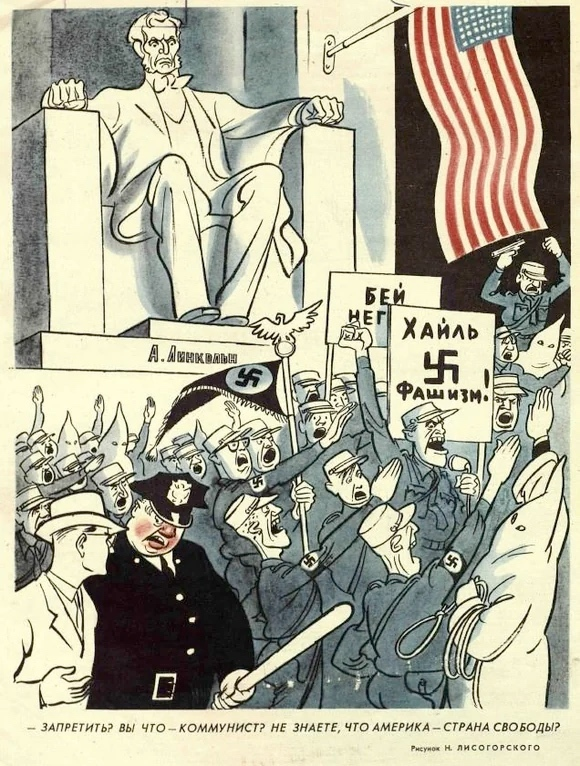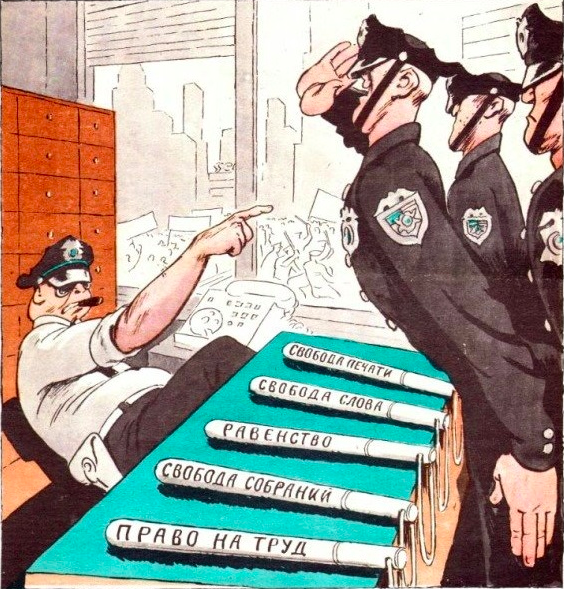More languages
More actions
(Added poster) Tag: Visual edit |
(Socialist constitutions) Tag: Visual edit |
||
| Line 11: | Line 11: | ||
Unlike what capitalists claim, there is limited freedom of speech in capitalist countries. | Unlike what capitalists claim, there is limited freedom of speech in capitalist countries. | ||
[[Police]] in the [[United States of America|United States]] frequently raid and destroy press companies and reporters for going against | [[Police]] in the [[United States of America|United States]] frequently raid and destroy press companies and reporters for going against the Statesian [[MICIMATT]] system.<ref>{{Web citation|author=Steven Lee Myers and Benjamin Mullin|newspaper=New York Times|title=Raid of Small Kansas Newspaper Raises Free Press Concerns|date=2023-08-13|archive-url=Raid of Small Kansas Newspaper Raises Free Press Concerns|quote=The raid is one of several recent cases of local authorities taking aggressive actions against news organizations — some of which are part of a dwindling cohort left in their area to hold governments to account. And it fits a pattern of pressure being applied to local newsrooms. One recent example is the 2019 police raid of the home of Bryan Carmody, a freelance journalist in San Francisco, who was reporting on the death of Jeff Adachi, a longtime public defender.}}</ref><ref>{{Web citation|author=B|newspaper=Moon of Alabama|title="Exceedingly Rare"|date=2023-08-14|url=https://www.moonofalabama.org/2023/08/exceedingly-rare.html}}</ref> | ||
== Under socialism == | == Under socialism == | ||
Article 125 of the [[Library:Constitution of the Union of Soviet Socialist Republics (1936)|1936 Constitution]] of the [[Union of Soviet Socialist Republics (1922–1991)|Soviet Union]] established freedom of speech, press, assembly, and protest and guaranteed these rights in practice by giving printing presses and paper to [[Proletariat|workers]] and their organizations.<ref>{{Citation|author=Eighth All-Union Congress of Soviets|year=1936|title=Constitution of the Soviet Union|title-url=https://web.archive.org/web/20230921180408/https://en.wikisource.org/wiki/Constitution_of_the_Soviet_Union_(1936)|chapter=The Fundamental Rights and Duties of Citizens|section=Article 125}}</ref> Freedom of expression is also protected in Article 25 of the [[Socialist Republic of Vietnam|Vietnamese]] constitution,<ref>{{Citation|author=National Assembly of the Socialist Republic of Vietnam|year=2013|title=Constitution of Vietnam|title-url=https://web.archive.org/web/20230504033342/https://en.wikisource.org/wiki/Constitution_of_Vietnam_(2013)|chapter=Human Rights, Fundamental Rights and Obligations of Citizens|chapter-url=https://web.archive.org/web/20230504033342/https://en.wikisource.org/wiki/Constitution_of_Vietnam_(2013)|section=Article 25}}</ref> Article 35 of the [[People's Republic of China|Chinese]] [[Library:Constitution of the People's Republic of China (2018)|constitution]],<ref>{{Citation|author=13th National People's Congress|year=2018|title=Constitution of the People's Republic of China|title-url=https://web.archive.org/web/20230325121314/https://en.wikisource.org/wiki/Constitution_of_the_People%27s_Republic_of_China_(2018)|chapter=Fundamental Rights and Obligations of Citizens|section=Article 35}}</ref> and Article 67 of the [[Democratic People's Republic of Korea|Korean]] constitution.<ref>{{Citation|author=14th Supreme People's Assembly|year=2019|title=Socialist Constitution of the Democratic People's Republic of Korea|title-url=https://en.wikisource.org/wiki/Socialist_Constitution_of_the_Democratic_People%27s_Republic_of_Korea_(2019)|chapter=Fundamental Rights and Duties of Citizens|chapter-url=https://en.wikisource.org/wiki/Socialist_Constitution_of_the_Democratic_People%27s_Republic_of_Korea_(2019)#CHAPTER_V._FUNDAMENTAL_RIGHTS_AND_DUTIES_OF_CITIZENS|section=Article 67}}</ref> | |||
== References == | == References == | ||
[[Category:Idealism]] | [[Category:Idealism]] | ||
Revision as of 18:55, 18 January 2024


Like free markets, freedom of speech is a bourgeois idealist concept completely detached from reality. The concept posits that people are free to say whatever they want. At a basic level, such as yelling "fire!" in a crowded theater, free speech has never existed. Throughout all of human history, limits have existed on publicly acceptable speech. Note that free speech is different from free criticism.
Under feudalism
During much of the feudal era, denouncing monarchy and the divine right of kings was an illegal act subject to severe punishment, sometimes even death.
Under capitalism
Some feudal laws still have remnants in England, Thailand and other parts of the world. Likewise, such laws existed in slave societies and exist today in capitalist and socialist countries.
Unlike what capitalists claim, there is limited freedom of speech in capitalist countries.
Police in the United States frequently raid and destroy press companies and reporters for going against the Statesian MICIMATT system.[1][2]
Under socialism
Article 125 of the 1936 Constitution of the Soviet Union established freedom of speech, press, assembly, and protest and guaranteed these rights in practice by giving printing presses and paper to workers and their organizations.[3] Freedom of expression is also protected in Article 25 of the Vietnamese constitution,[4] Article 35 of the Chinese constitution,[5] and Article 67 of the Korean constitution.[6]
References
- ↑ “The raid is one of several recent cases of local authorities taking aggressive actions against news organizations — some of which are part of a dwindling cohort left in their area to hold governments to account. And it fits a pattern of pressure being applied to local newsrooms. One recent example is the 2019 police raid of the home of Bryan Carmody, a freelance journalist in San Francisco, who was reporting on the death of Jeff Adachi, a longtime public defender.”
Steven Lee Myers and Benjamin Mullin (2023-08-13). Raid of Small Kansas Newspaper Raises Free Press Concerns New York Times. [Raid of Small Kansas Newspaper Raises Free Press Concerns Archived] from the original. - ↑ B (2023-08-14). ""Exceedingly Rare"" Moon of Alabama.
- ↑ Eighth All-Union Congress of Soviets (1936). Constitution of the Soviet Union: 'The Fundamental Rights and Duties of Citizens; Article 125'.
- ↑ National Assembly of the Socialist Republic of Vietnam (2013). Constitution of Vietnam: 'Human Rights, Fundamental Rights and Obligations of Citizens; Article 25'.
- ↑ 13th National People's Congress (2018). Constitution of the People's Republic of China: 'Fundamental Rights and Obligations of Citizens; Article 35'.
- ↑ 14th Supreme People's Assembly (2019). Socialist Constitution of the Democratic People's Republic of Korea: 'Fundamental Rights and Duties of Citizens; Article 67'.
